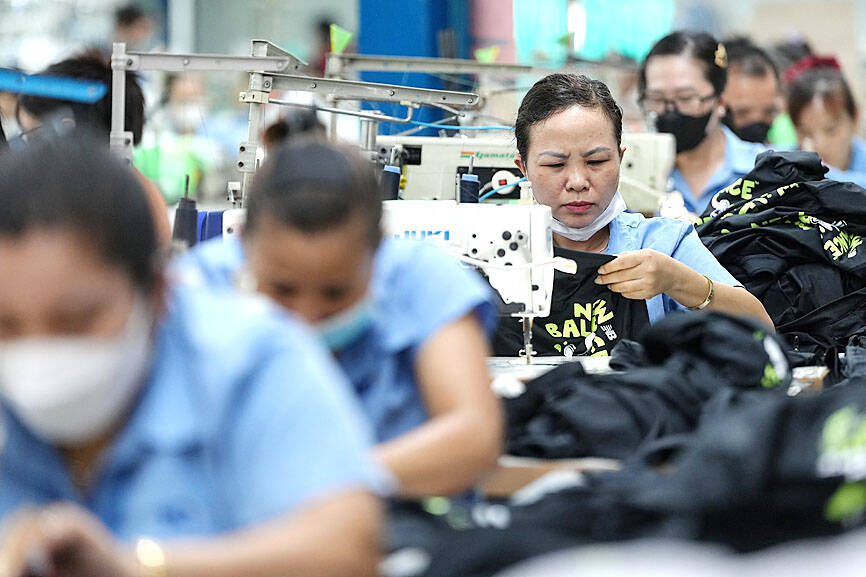US and Vietnamese businesses have asked US President Donald Trump’s administration to delay its planned 46 percent tariff on Vietnamese goods, saying the levy would hurt them and bilateral commercial relations.
The Vietnam Chamber of Commerce and Industry (VCCI) and the American Chamber of Commerce (AmCham) in Hanoi expressed concern to US Secretary of Commerce Howard Lutnick in a letter dated on Saturday, saying the tariff, to take effect on Wednesday, was “shockingly high.”
“Lower tariffs for products coming into Vietnam, and for products reaching the American consumer is what will help US companies, the economy, and consumers,” AmCham and VCCI said in a statement. “Higher tariffs will not.”

Photo: AFP
The Southeast Asian country, a major regional manufacturing base for many Western companies, posted a trade surplus of more than US$123 billion with the US, its largest export destination, last year.
Trump and Vietnamese President To Lam agreed on Friday to discuss a deal to remove tariffs, both said after a phone call that Trump called “very productive.”
Even before Trump’s Wednesday announcement of sweeping global tariffs, Vietnam cut several duties as part of a series of concessions to the US, which also included pledges to buy more US goods, such as planes and agriculture products.
Meanwhile, Hong Kong Financial Secretary Paul Chan (陳茂波) on Sunday said that US tariffs undermine international trade and would ultimately hurt Americans.
There are no winners in trade wars, Chan wrote in a blog, adding that the levies imposed by Trump had dragged down the US stock market.
Chan at a seminar on Saturday said that the territory would not impose countermeasures on the US.
The territory’s government “of course, strongly opposes the actions by the US, and we also need to be defensive,” Chan said.
Still, Hong Kong should remain “free and open,” and has a mechanism to identify risks that could threaten the financial system, he said.
Trump announced global tariffs, including a 34 percent charge on imports from China, which also apply to Hong Kong.
Last year, the US accounted for 6.5 percent of Hong Kong’s overall merchandise exports, Chan wrote.
Meanwhile, the territory’s shipments to Southeast Asia and the Middle East have been growing, with Southeast Asia becoming its second-largest merchandise export market, the financial secretary said.
Additional reporting by Bloomberg

SELL-OFF: Investors expect tariff-driven volatility as the local boarse reopens today, while analysts say government support and solid fundamentals would steady sentiment Local investors are bracing for a sharp market downturn today as the nation’s financial markets resume trading following a two-day closure for national holidays before the weekend, with sentiment rattled by US President Donald Trump’s sweeping tariff announcement. Trump’s unveiling of new “reciprocal tariffs” on Wednesday triggered a sell-off in global markets, with the FTSE Taiwan Index Futures — a benchmark for Taiwanese equities traded in Singapore — tumbling 9.2 percent over the past two sessions. Meanwhile, the American depositary receipts (ADRs) of Taiwan Semiconductor Manufacturing Co (TSMC, 台積電), the most heavily weighted stock on the TAIEX, plunged 13.8 percent in

A wave of stop-loss selling and panic selling hit Taiwan's stock market at its opening today, with the weighted index plunging 2,086 points — a drop of more than 9.7 percent — marking the largest intraday point and percentage loss on record. The index bottomed out at 19,212.02, while futures were locked limit-down, with more than 1,000 stocks hitting their daily drop limit. Three heavyweight stocks — Taiwan Semiconductor Manufacturing Co (TSMC, 台積電), Hon Hai Precision Industry Co (Foxconn, 鴻海精密) and MediaTek (聯發科) — hit their limit-down prices as soon as the market opened, falling to NT$848 (US$25.54), NT$138.5 and NT$1,295 respectively. TSMC's

ASML Holding NV, the sole producer of the most advanced machines used in semiconductor manufacturing, said geopolitical tensions are harming innovation a day after US President Donald Trump levied massive tariffs that promise to disrupt trade flows across the entire world. “Our industry has been built basically on the ability of people to work together, to innovate together,” ASML chief executive officer Christophe Fouquet said in a recorded message at a Thursday industry event in the Netherlands. Export controls and increasing geopolitical tensions challenge that collaboration, he said, without specifically addressing the new US tariffs. Tech executives in the EU, which is

In a small town in Paraguay, a showdown is brewing between traditional producers of yerba mate, a bitter herbal tea popular across South America, and miners of a shinier treasure: gold. A rush for the precious metal is pitting mate growers and indigenous groups against the expanding operations of small-scale miners who, until recently, were their neighbors, not nemeses. “They [the miners] have destroyed everything... The canals, springs, swamps,” said Vidal Britez, president of the Yerba Mate Producers’ Association of the town of Paso Yobai, about 210km east of capital Asuncion. “You can see the pollution from the dead fish.